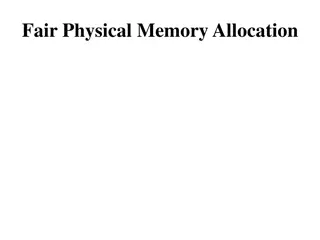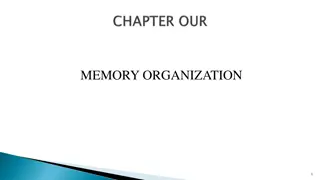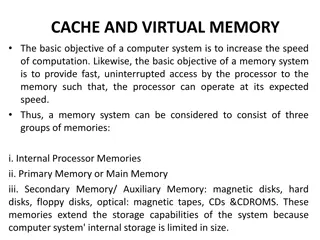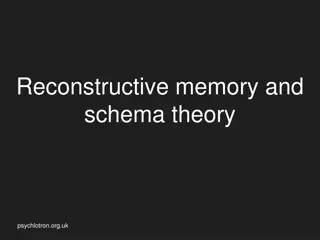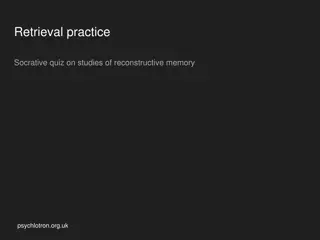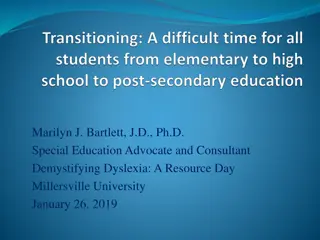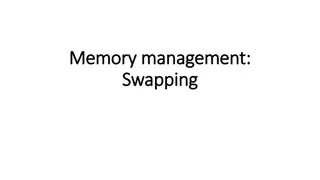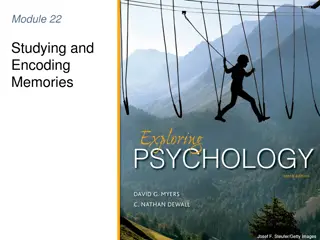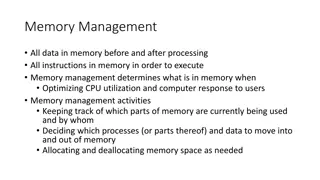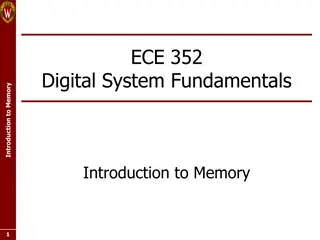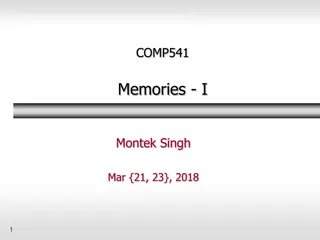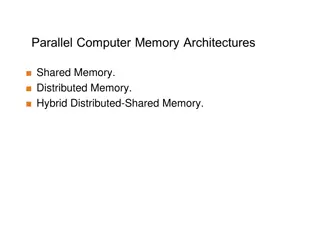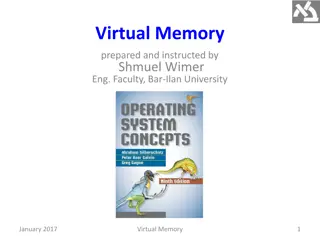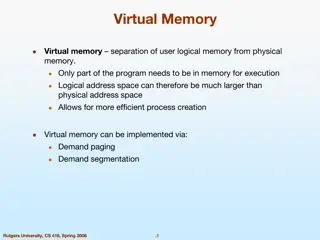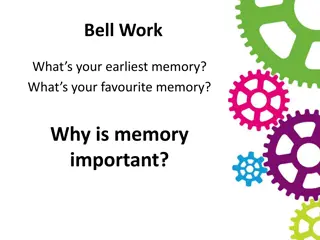Understanding Bartlett's Theory of Reconstructive Memory
Bartlett's theory of reconstructive memory explores how memories are reconstructed based on past experiences, beliefs, and expectations. The War of the Ghosts study demonstrated that memory is an active process where information is inaccurately recalled and reconstructed. Social and cultural influences play a role in memory retrieval, and individuals focus on extracting the overall meaning of events rather than exact details. This theory highlights how memory is reconstructed and influenced by various factors.
Download Presentation

Please find below an Image/Link to download the presentation.
The content on the website is provided AS IS for your information and personal use only. It may not be sold, licensed, or shared on other websites without obtaining consent from the author. Download presentation by click this link. If you encounter any issues during the download, it is possible that the publisher has removed the file from their server.
E N D
Presentation Transcript
Bartletts theory of reconstructive memory Thursday, 25 July 2024 Last week Last lesson Last month What is a strength of a matched pairs design in psychological research? Outline the conclusions that Bartlett came to after he conducted his War of the Ghosts study. What are the three types of interviews that can be used to collect information. S U SS What do you think the term reconstructive memory means? How can you link this idea to Bartlett s War of the Ghosts study? LO: To be able to describe and evaluate Bartlett s theory of reconstructive memory.
Lets see how good your memories are. You have 1 minute to look at this picture. Then you will have 3 minutes to draw it as accurately as you can. LO: To be able to describe and evaluate Bartlett s theory of reconstructive memory.
How might our knowledge of Roman numerals have affected out memory for this task? LO: To be able to describe and evaluate Bartlett s theory of reconstructive memory.
Reconstructive memory fragments of stored information (memories) are reassembled during recall. The gaps are filled in by our expectations and beliefs so that we can produce a story that makes sense. Think link War of the Ghosts! LO: To be able to describe and evaluate Bartlett s theory of reconstructive memory.
Bartletts theory of reconstructive memory Whenever you are asked to discuss a theory, it is important that you can talk about 4-5 things. Remember to use key terms in our explanation. 1. The theory The War of the Ghosts study showed that memory is an active process. People remember overall meaning of events, and, when retrieving information, they rebuild the memory. 2. Memory is inaccurate We do not have exact recall. Elements are missing and memories are not an accurate representation of what happened. 3. Reconstruction We record small pieces of information in long-term memory. During recall we recombine them to tell the whole story. Each time, the elements are combined slight differently. LO: To be able to describe and evaluate Bartlett s theory of reconstructive memory.
Bartletts theory of reconstructive memory Whenever you are asked to discuss a theory, it is important that you can talk about 4-5 things. Remember to use key terms in our explanation. 4. Social and cultural influences The way that information is stored and recalled is affected by social and cultural expectations, like using the phrase going fishing rather than hunting seals . 5. Effort after meaning We focus on the meaning of events and make an effort to understand the meaning to make sense of the parts of the story. Effort after meaning making sense of something unfamiliar after it has happened. LO: To be able to describe and evaluate Bartlett s theory of reconstructive memory.
1 2 Complete the exam question in your books. Steps for success: Use key terms/phrases e.g. memory is inaccurate/effort after meaning Write at least 2 paragraphs Refer to the scenario at least 2-3 times. E.g. refer to Ann and Martyn. LO: To be able to describe and evaluate Bartlett s theory of reconstructive memory.
Ann and Martyn were at the bank when a person attempted to rob it. Later, when they were at the police station, they gave different accounts of the incident. Ann said that the incident happened in a different order than Martyn recalled. She also remembered the robber wearing different clothes and saying different things to the people at the bank than Martyn recalled. Ann and Martyn were at the bank when a person attempted to rob it. Later, when they were at the police station, they gave different accounts of the incident. Ann said that the incident happened in a different order than Martyn recalled. She also remembered the robber wearing different clothes and saying different things to the people at the bank than Martyn recalled. Use your knowledge of the theory of reconstructive memory to explain why Ann and Martyn have different memories of the same event. (6 marks) Use your knowledge of the theory of reconstructive memory to explain why Ann and Martyn have different memories of the same event. (6 marks) Ann and Martyn were at the bank when a person attempted to rob it. Later, when they were at the police station, they gave different accounts of the incident. Ann said that the incident happened in a different order than Martyn recalled. She also remembered the robber wearing different clothes and saying different things to the people at the bank than Martyn recalled. Ann and Martyn were at the bank when a person attempted to rob it. Later, when they were at the police station, they gave different accounts of the incident. Ann said that the incident happened in a different order than Martyn recalled. She also remembered the robber wearing different clothes and saying different things to the people at the bank than Martyn recalled. Use your knowledge of the theory of reconstructive memory to explain why Ann and Martyn have different memories of the same event. (6 marks) Use your knowledge of the theory of reconstructive memory to explain why Ann and Martyn have different memories of the same event. (6 marks) Ann and Martyn were at the bank when a person attempted to rob it. Later, when they were at the police station, they gave different accounts of the incident. Ann said that the incident happened in a different order than Martyn recalled. She also remembered the robber wearing different clothes and saying different things to the people at the bank than Martyn recalled. Ann and Martyn were at the bank when a person attempted to rob it. Later, when they were at the police station, they gave different accounts of the incident. Ann said that the incident happened in a different order than Martyn recalled. She also remembered the robber wearing different clothes and saying different things to the people at the bank than Martyn recalled. Use your knowledge of the theory of reconstructive memory to explain why Ann and Martyn have different memories of the same event. (6 marks) Use your knowledge of the theory of reconstructive memory to explain why Ann and Martyn have different memories of the same event. (6 marks)
https://www.youtube.com/watch?v=R-sVnmmw6WY Let s see what fast-talking Hank has to say about memory. LO: To be able to describe and evaluate Bartlett s theory of reconstructive memory.
Bartletts theory of reconstructive memory Thursday, 25 July 2024 Last week Last lesson Last month What is an independent groups design? Outline the results of Bartlett s War of the Ghosts study. What does the term effort after meaning mean? Condition 1 Condition 2 Bartlett states that memory recall is inaccurate. Can you give an example of when inaccurate recall may have a negative effect? Explain. LO: To be able to describe and evaluate Bartlett s theory of reconstructive memory.
Watch the following video: Make notes about the key points outlined which link to Bartlett's Reconstructive Theory. LO: To be able to describe and evaluate Bartlett s theory of reconstructive memory.
Task 1: Using card sort pieces, separate information into three PEE paragraphs. 10 Minutes LO: To be able to describe and evaluate Bartlett s theory of reconstructive memory.
LO: To be able to describe and evaluate Bartletts theory of reconstructive memory.
Task 2 PARC task Outline and evaluate Bartlett s theory of reconstructive memory. (9 marks) Steps for Success: Steps for Success: Paragraph 1: The theory/memory is inaccurate/reconstruction. Paragraph 3: P More realistic research. Paragraph 4: P Some memories are accurate. Paragraph 2: Social and cultural influences / effort after meaning. Paragraph 5: P Real world application. You can use the planning sheet to help you if you need it. Follow the steps and briefly plan it out before you write it. Make sure that you evaluate properly, some sentence starters could be: This shows that This means LO: To be able to describe and evaluate Bartlett s theory of reconstructive memory.
Q1. Reconstruction shows that memory is: a. Consistent over time b. Almost always accurate c. Acoustically encoded d. An active process. LO: To be able to describe and evaluate Bartlett s theory of reconstructive memory.
Q2. A major influence on reconstructive memory is: a. The time it takes to recall something b. Our level of intelligence c. Our social and cultural expectations d. The position of events in a story. LO: To be able to describe and evaluate Bartlett s theory of reconstructive memory.
Q3. Bartlett called our attempt to make sense of memory fragments: a. Effort after meaning b. The serial position effect c. The multi-store model d. Memory deconstruction. LO: To be able to describe and evaluate Bartlett s theory of reconstructive memory.
Q4. A significant strength of Bartletts theory is that it: a. Ignores the individual s social and cultural beliefs b. Can explain why memories are so accurate c. Is based on well-controlled research d. Can help us understand eyewitness testimony. LO: To be able to describe and evaluate Bartlett s theory of reconstructive memory.
Q5. The two groups in an independent groups design may be: a. Control and matched b. Control and systematic c. Variable and experimental d. Control and experimental. LO: To be able to describe and evaluate Bartlett s theory of reconstructive memory.
Next lesson: You will have a Knowledge Organiser Quiz at the beginning of next lesson. LO: To be able to describe and evaluate Bartlett s theory of reconstructive memory.


